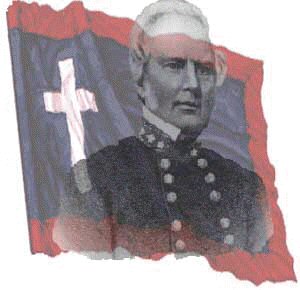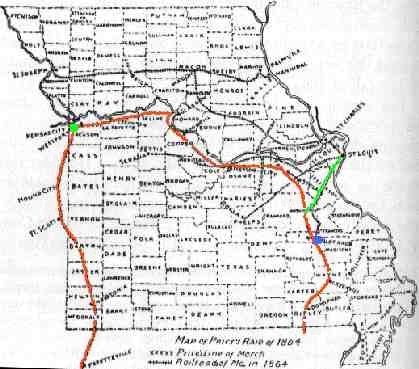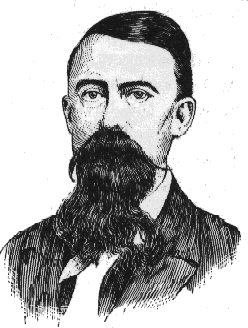

Gen. Price's raid on Missouri in fall of 1864 caused considerable panic to the Federals within the State. Over 6,000 troops had to be recalled from the looting/burning of Georgia to pursue Gen. Price's 12,000 man cavalry force threatening St. Louis. After leaving Doniphan Missouri on Sept. 20, 1864, Price moved against the Federals in Ft. Davidson at Pilot Knob in hope of capturing vitally needed guns and ammunition for his men. Due to the deep trench before the fortification at Ft. Davidson, Price lost from 800 to 1,000 men in his attempts to rush the fort. In preparation of attacking St. Louis, Price sent a squad of Shelby's cavalry to secure the Cheltenham Post/Telegraph office, which was then only four miles outside of the city. Due to a change of plans after entering Franklin County, Price ordered the attack on St. Louis aborted, and proceeded west to Jefferson City.
"Shelby's Mule"
(also known as "Waiting on the Federals")
Some say this song was as popular as "Dixie" within the State.
1st Verse:
The Union folks away up north were one time much afraid,
'Bout something coming from the South, they said it was a raid.
Now I will tell you what it was, if you will just keep cool—
It had long ears, and a long slick tail, and called Jo Shelby's Mule.
CHORUS:
Shout Boys, make a noise, the Yankees are afraid
That something's up and hell's to pay when Shelby's on a raid.
2nd Verse:
Once this mule went on a spree, up close to Lexington,
And every time he gave a snort he made the Blue Coats run.
Coming back through “Old Saline” he got into a trap,
He seared Old Brown, kicked up his heels, and came back safe to Pap.
CHORUS:
Shout Boys, make a noise, the Yankees are afraid
That something's up and hell's to pay when Shelby's on a raid.
3rd Verse:
Once I went to see Old Abe and found him in a rage,
Because this mule had started north, and just then crossed “sage.
Indeed, his anger knew no bounds, says I, “Sir, pray keep cool.”
“I can't,” said he, “I've lost so much by Shelby's long tailed Mule.”
CHORUS:
Shout Boys, make a noise, the Yankees are afraid
That something's up and hell's to pay when Shelby's on a raid.
4th Verse:
“Old Rosy” got a long dispatch, which came from way down East.
Saying, “Take some thirty thousand men and try to catch that beast.”
To obey orders he was bound, but said Abe was a fool,
And hadn't halter strong enough to hold Jo Shelby's Mule.
CHORUS:
Shout Boys, make a noise, the Yankees are afraid
That something's up and hell's to pay when Shelby's on a raid.
5th Verse:
Some say our State did not secede, but let me tell you now
That if she did or if she didn't we'll have her anyhow.
Let us alone, we'll do the same, that is the Southern rule;
If that won't do we'll pack the State down South on Shelby's Mule.
CHORUS:
Shout Boys, make a noise, the Yankees are afraid
That something's up and hell's to pay when Shelby's on a raid.

Approximate route of Gen. Sterling Price's 1864 Raid is marked in red. The green route to St. Louis represents possible route of Joe Shelby's scouts that rode into the suburbs of St. Louis. Reportably four members of the Shelby's command captured the Cheltenham Post/telegraph office which is now located within the city limits of St. Louis (6437 Manchester road). The large blue dot marks the location of Ft. Davidson (at Pilot Knob) where battle took place. The large green dot near Kansas City is the site of the Battle of Westport. Above map taken from "A History of Missouri", by Eugene Morrow Violette, 1918. [Engagements Fought During the Expedition]

Gen. Joe Shelby
Shelby is considered by many to be the best Confederate Cavalry Commander of Price's Army.
Who Were the Confederate Horsemen that Entered St. Louis County During Price's 1864 Raid?
According to author/historian William C. Winter, Confederate raiders on Sept. 29th, 1864 entered the Post Office/Store of Augustus Muegge, located at the corner of present day Dale Avenue and Manchester Road. Muegge reported that four horsemen rode up to his establishment around 5:00 PM, asking questions concerning the whereabouts of area military installations. After being asked about his political views, Muegge, decided it was time to escape, especially since one raider announced, "It's just such men as you that we want to kill" while drawing a pistol. Postmaster Muegge made it safely to Union authorities, but by the time Union troops arrived at his store, the raiders had disappeared. This would have been the approximate time when Price's command was advancing in the direction of St. Louis. It is very likely these men were those attached to Joe Shelby's Cavalry which were at the vanguard of Gen. Price's command.
Capt. Arthur McCoy, "The Wild Irishman"
According to an authority on Shelby's Cavalry (John N. Edwards, "Noted Guerrillas, The Warefare of the Border", 1877; Bryan, Brand & Company; St. Louis, Mo.), the "advance had been led valiantly by Capt. Arthur McCoy", the "Wild Irishman" of Shelby's division. Who was this former tinner who resided in St. Louis prior to the war ? According to Edwards, "At the first tap of the recruiting drum, impetuous as a boy and as eager, he espoused the cause of the South and joined the 1st Missouri Confederate Infantry, Bowen's immortal yet decimated regiment--that regiment which Beauregard lifted his hat to as it was marching past-or, rather, to what was left of it-after Shiloh, and exclaimed: "I salute the 1st Missouri. I uncover to courage that has never yet been surpassed." In the infantry, however, McCoy would have dwindled into a consumptive-for his chest was weak, and he had that hectic flush, and that dry, short, rasping cough that were ominous. He needed the air and the exercise of a Comanche. He had to breath where there were no canvas houses, no shelter, no covering save a blanket, and no habitation save the leaves on the trees."
"After Shiloh, the name and fame of Shelby were beginning to fill the West, and there came to him, attracted by the unexampled enterpise and heroism of the man, quite a large number of daring spirits who asked only esprit d'u corps and a leader that would fight every hour in every day for a year and a day. Among them was Arthur McCoy, one of Bowen's best and bravest--one whom he trusted and loved-but one whom he knew had to go the long journey very soon if held in the poisonous camps of an army, inactive and at rest. A tall, gaunt man was Arthur McCoy, six feet and over, a little stooped about the shoulders, very ]ong in the arms, having a stride like a race-horse, and a nervous energy that was expending itself even while he slept. All the lower face was massive-the lower jaw especially square cut and huge. The eyes were of that cold, glitteriag, penetrating blue that might be cruel as a serpent's, soft and tender as the eyes of confidence or trust. When the battle was duhious or desperate, or when the wreck was darkest and thickest, and the dead lay rank and plentiful, the eyes seemed to transform themselves and become absolutely scintillant."
"About the man's whole nature, too, there was an element of grotesqueness impossible to analyze. He sang little snatches of song in battle; he rode out in advance of his own skirmish line and challenged Federal skirmishers to single combat; he would get down on his knees under fire the most pitiless, uncover himself and pray fervently beside some comrade mortally wounded; he seemed never to have known what the meaning of fear was; he begged incessantly to be sent upon forlorn and desperate service; he was a spy without a peer in either army; be was a scout that seemed to have leagued with the devil and received from his majesty invaluable protection papers; he charged picketts for pastime, and rode yelling and shooting through Federal outposts, at the bead of fifty or sixty followers, at all hours and in any weather. Shelby's division gave him the soubriquet of the "Wild Irishman," and yet for cold, calm, penetrating soldier-sense-for acuteness, military logic and undoubted strategy, McCoy had the head of a Vidocq and the nerve of d'Artagnan. Seven times during the war-through the Federal lines, and past scouts, patrols, cantonments, and militia and predatory bands-McCoy came into St. Louis with a thousand letters at a time, and departed hence with as many more."
"A Confederate Ball in St. Louis"
"Once, on his many trips into St. Louis, and in company with Captain John Howard, also of the same city, a man in no manner inferior to McCoy in dash and heroism, he visited a house at which there were two Federal officers and several ladies. McCoy had with him an elegant cavalry uniform for a Confederate Colonel, and as he was just on the eve of his departure, he concluded to take his farewell in the following manner: He requested one of the ladies to play Dixie, and she politely conseated. The Federal officers looked annoyed, but remained quiet. As the tune began to fill the room and the music to expand the blood as it were and put fire into the eyes, McCoy suddenly sprang to his feet, covered the Federal major with his unerring revolver, and bade bim get up and dance. The officer refused. McCoy still insisted more sternly, and declared that he should not only dance, but that he should put on a rebel uniform for once in his life, lift his hat at the mention of the name of Jefferson Davis, and dance to the tune of Dixie. Seeing murder in McCoy's cold blue eyes, the Federal major complied with each order strictly, and actually in the full uniform of a Confederate colonel did dance to the music of Dixie, his companion, a lieutenant of the Eighth Missouri Federal Infantry, looking on and applauding vociferously."
Benton Barracks
"As McCoy rode out from St. Louis, in the cold gray of the following morning, the devil still seemed to have possession of him. As he passed Benton Barracks a sentinel stood by theroadside with his gun at a right shoulder shift. McCoy rode up to him and halted: "I am a Confederate officer. I represent the Confederate President--if you should present arms to me I should consider that you had presented them to Mr. Jefferson Davis. Present arms!" The sentinel thought the man was evidently mad. It was still early morning. No soldiers were astir anywbere about the barracks. McCoy's revolver was at the soldier's breast before could take his musket from his shoulder. "You will not present arms to me?" "Not to save your life." "But you see I have the drop on you! Do you want me to kill you?" Still thinking McCoy was one of his own uniform, and being drunk or mischievous, was trying to play a prank on him, the sentinel replied, "shoot and be d--d!"
"McCoy's face darkened instantly, and he cocked his pistol. "I will not shoot you so," he said, "nor will I shoot you at all without giving you a chance for your life. Listen, I shall ride back fifty paces, turn my horse, and charge you. As I come by I shall fire at you once. You have but one shot and I who have eighteen will take but one also. Get ready." The sentinel, as he saw McCoy deliberately countermarch and wheel about to charge, began, at last, to have his suspicions aroused. He took his musket from his shoulder and cocked it and waited. McCoy dashed furiously down upon the sentinel, and the sentinel, when he was within about ten paces of him, firied at point blank range and missed. As McCoy passed him, he put out his pistol suddenly and shot him down where he stood, the garrison turning out in force, and hurriedly saddled, cavalry coming on in rapid pursuit. The sentinel, however, although badly wounded, finally recovered, and McCoy, scarcely quickening his pace, rode on southward unmolested."
Capture and Escape
"Once the Federals had him a prisoner. His escape was, in every way, characteristic of the man. He had been on a scout with eight men towards the Mississippl river. Seventy-three Federals started him in a cane brake and never stopped pursuing him for eleven miles. Finally they killed his horse and literally rode over and crushed him. He was carried to De Val's Bluff previous to being conveyed to St. Louis for trial as a spy and desperado. Shelby was at Clarendon, twelve miles below, on White river, and when the night came-a very dark and gloomy night--McCoy broke suddenly away from his guards and leaped head-foremost into the river. The waves were rough and the wind was blowing. Two hundred shots were fired at him in the darkness, and innumerable yawls put out from the steamers and gunboats in search of the desperate Irishman. He was a fine swimmer, and without using his arms in any manner, he drifted down under the stern of the gunboat Tyler, and hid himself there for over an hour, or until all pursuit was abandoned. Then letting go his hold the current carried him on past all danger and safe into the lines of his old brigade."
"Later, in 1864, a deed was done by McCoy which attracted the attention and won the admiration of two opposing forces. General John B. Clark was attacking Glasgow from one side of the river, in 1864, and General Shelby from the other. Between the two lines drawn about the doomed town were the Federal forts and garrison commanded by General Chester Harding. A large steamboat lay at the wharf and Shelby desired to know if it were serviceable; if it were, he intended to man it and ferry over his command, and to attack from the north side. He did not want to sacrifice over one man in the perilous undertaking, and he did not desire to order any soldier to perform the desperate duty. Volunteers were called for, and while fifty came to the front, McCoy was chosen because he knew more than any of them about steamboats and their machinery, and because he pleaded so hard to be permitted to take the risk."
"He started in a skiff as slight as a pasteboard. Having to pull himself, his back was necessarily to the town, thus depriving him of whatever advantage he might have attained by watching the operations of the enemy. Glasgow is built upon a hill, and from the foot of the bluff to the river there is probably a stretch of bottom land a dozen paces across. Closely engaged from the south, the Federal skirmishers did not descend from the hill tops, where, half hidden and partially intrenched, they fired closely and vigorously upon McCoy. He kept right onward. As he left the shelter of his own lines, the bullets thickened in the water about him and fairly plowed up the surface of the river with lead Collins, with two guns of his memorable battery, succored him all that was possible and threw canister rapidly into the skirmishers. Once when the fire was desperately hot, McCoy turned around upon his seat, ceased rowing, and lifted his hat to the Federal sharpshooters. Both sides cheered spontaneously. How he escaped is a matter yet unexplained. Probably two hundred men fired at him, each man firing five shots, or one thousand shots in all. Blood was not drawn once from his body, miraculous to relate. One bullet cut off a lock of his hair, another knocked his cap into the river, which he deliberately stopped to pick up, seven balls struck the skiff in various parts, four more went through his clothes, and one cut almost in two at the oar-lock the left hand oar. In despite of everything, however, McCoy gained the northern bank, landed the boat, obtained what information he desired, and actually returned as he had crossed under a tremendous volley of small arms."
Lexington to Independence
"Curtis' heavy division, retreating before General Price all the way from Lexington to Independence, held the western bank of the Little Blue, and some heavy stone was and fences beyond. Marmaduke and Shelby broke his bold loose from these, and pressed him rapidly back to and through Independence, the two Colorado regiments covering his rear stubbornly and well. Side by side McCoy and Todd had made several brilliant charges during the morning, and had driven before them with great spirit and dash every Colorado squadron halted to resist the continual marching forward of the Confederate cavalry. Ere the pursuit ended for the day, half of the 2d Colorado regiment drew up on the crest of a bold hill and made a gallant fight. Their Major, Smith, a brave and dashing officer, was killed here, and here Todd fell. Gen. Shelby, as was his wont, was well up with the advance, and leading recklessly the two companies of Todd and McCoy. Next to Shelby's right rode Todd, and upon his left was.McCoy. Close to these and near to the front files were Col. Nichols, Thrailkill, Ben Morrow, Ike Flannery and Jesse James. The trot had deepened into a gallop, and all the cloud of skirmishers covering the head of the rushing column were at it, fierce and hot, when the 2d Colorado sept the road with a furious volley, broke away from the a strong position held by them, and burned on through the streets of Independence followed by the untiring McCoy, as lank as a fox-hound and as eager."